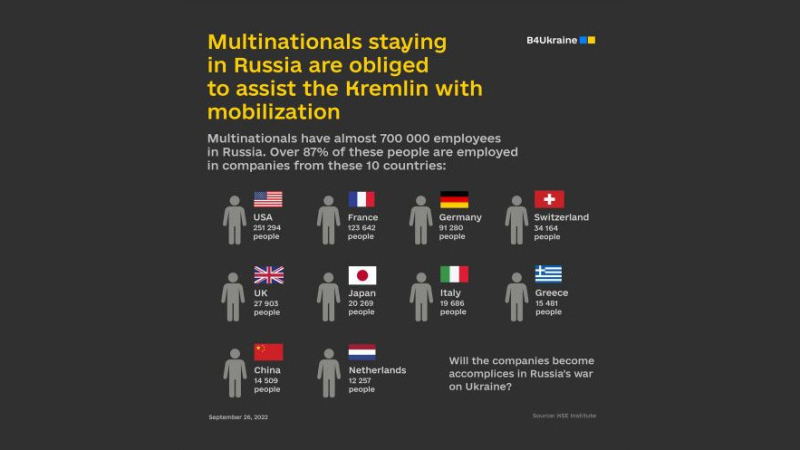Multinational companies in Russia are now obliged to assist the Kremlin with war mobilization
For media inquiries, to support the Declaration, or to join the B4Ukraine coalition, contact@businessforukraine.info or +380 97 532 3354 (Telegram and Whatsapp).

For media inquiries, to support the Declaration, or to join the B4Ukraine coalition, contact@businessforukraine.info or +380 97 532 3354 (Telegram and Whatsapp).
International companies, including banks, are now obliged to assist the Kremlin’s war mobilization by helping conscript soldiers and equip the army. Between them, they have at least 700,000 employees and $141 billion in assets, according to an analysis by B4Ukraine – a coalition of Ukrainian and international civil society organizations. B4Ukraine is urging multinationals to leave Russia immediately to avoid becoming directly complicit in Russia’s devastating war, war crimes, and atrocities in Ukraine.
Table: Banks with significant staff numbers in Russia
| Bank | Staff in Russia | Status (leave-russia.org) | Source (staff) |
| Raiffeisen Bank | 9,023 | Stay - continue operations | RBI |
| UniCredit | 4,466 | Stay - continue operations | UniCredit |
| Intesa Sanpaolo | 3,378 | Wait - pausing investments | Datanyze |
| Citi | Over 3,000 | Wait - scaling back | TAdviser |
| JPMorgan Chase | 2,060 | Wait - scaling back | |
| Deutsche Bank | Over 1,500 | Leave - withdrawal | Deutsche Bank |
| ING | 460 | Wait - pausing investments | Retail Banker |
| HSBC | 200 | Wait - scaling back | |
| Crédit Agricole | 170 | Leave - suspension | Crédit Agricole |
| Credit Suisse | 125 | Wait - scaling back | Bloomberg |
| BNP Paribas | 134 | Leave - suspension |
Data compiled by BankTrack. Banks for which no data could be found, including Chinese state-owned banks, are not listed.
On September 21, 2022, almost seven months into Russia’s full-scale war on Ukraine, Russian president Vladimir Putin announced partial mobilization in Russia. The accompanying legislation on mobilization - known as Article 9 of Federal Law No. 31-FZ - mandates all organizations, including international companies, to conduct military registration of the staff if at least one of the employees is liable for military service. They must also assist with delivering the summons from the military to their employees, ensure the delivery of equipment to assembly points or military units, and provide buildings, communications, land plots, transport and other material means as well as information.
“Putin’s actions make the clearest demands on businesses to date: either support the conflict and be complicit in war crimes or leave Russia. Normally, we shouldn’t see such a clear binary in a conflict situation: leaders should not require businesses to participate in war crimes, but that’s what Putin is doing now. The impact is clear: foreign businesses need to cut their ties. This can result in significant losses for those businesses but the alternative is worse. This should also send a clear signal to businesses that they need a better plan of action for how they disengage from situations of conflict and authoritarianism,” said Tara Van Ho, Co-Director of the Essex Business & Human Rights Project at the University of Essex.
The legislation applies to all of the 1,610 companies that are currently operating on a full or limited scale in Russia. Analysis from the Kyiv School of Economics reveals that 87% of people employed by multinationals in Russia work for companies from 10 countries: the USA, France, Germany, Switzerland, the UK, Japan, Italy, Greece, China, and the Netherlands. In particular, US companies employ 251,294 people in Russia, French companies employ 123,642 people, and German companies employ 91,280 people. These companies work in the automotive sector, food and drinks, tobacco, retail, pharma, electronics sector, and many others.
According to Russian media, businesses have already begun preparations for a possible mobilization of employees, including creating special mobilization departments. “So far, most of the multinationals operating in Russia have been indirectly involved in the war by paying taxes to the Russian state, contributing to the war economy. Now the Kremlin’s mobilization makes companies directly involved in conscripting the soldiers among their employees who will come to Ukraine to kill and occupy,” said Nataliia Popovych, Founder of One Philosophy and WeAreUkraine.info, adding: “It gives carte blanche to Russia’s authorities to pull resources from companies. This is a red flag for companies who have chosen to remain in Russia. Your risk of complicity in Russia’s war crimes in Ukraine is now very real.”
“Regardless of whether a business is under sanctions, the international responsibilities for companies are clearly set out in the United Nations Guiding Principles on Business and Human Rights,” added Popovych. “It is an obligation for international companies to understand how their operations cause, contribute to or are linked to impacts on rights-holders and the conflict itself. How a company chooses to meet its obligations to protect and respect rights in Ukraine will define its reputation far beyond Russia for years to come.”
